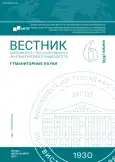Author’s Vocabulary in Science Fiction: Ways of Formation and Interlanguage Translation (based on the Works of William Gibson)
- Autores: Iaroshenko P.N.1
-
Afiliações:
- State University of Education, Mytishi
- Edição: Nº 6(874) (2023)
- Páginas: 138-145
- Seção: Linguistics
- URL: https://journal-vniispk.ru/2542-2197/article/view/351179
- ID: 351179
Citar
Resumo
The main problem of the study is the formation of the author’s vocabulary in the text of science fiction and the specifics of its translation into Russian. Research methods: analysis, synthesis, comparative analysis, continuous text sampling method. The materials for the investigation include stories and novels by W. Gibson, as well as their translations into Russian. The results of the study are presented in the form of an analysis of 110 author’s neologisms and their translations into Russian. The specifics of translation are determined by the use of calculus, transliteration and lexical additions, concretization, creation of a new term and lexical omissions.
Palavras-chave
Sobre autores
Petr Iaroshenko
State University of Education, Mytishi
Autor responsável pela correspondência
Email: petrojyar@yandex.ru
PhD Student, Department of Language theory, English studies and Applied Linguistics
RússiaBibliografia
- Suvin, Darko. (1979). Metamorphoses of Science Fiction: Studies on the Poetics and History of a Literary Genre. Yale UP.
- Csicsery-Ronay, Istvan, Jr. (2008). The Seven Beauties of Science Fiction. Wesleyan UP, 2008.
- Namitokova, R. Y. (1986). Avtorskiye neologizmy: slovoobrazovatel’nyy aspect = Author’s neologisms: the wordformation aspect / Ed. by I. A. Shirshov; Adygeyskiy gosudarstvennyy pedagogicheskiy institute. Rostov-on-Don: Rostov n/D: Izdatel’stvo Rostovskogo universiteta, 1986. (In Russ.)
- Lykov, A. G. (1976). Sovremennaya russkaya leksikologiya (russkoye okkazional’noye slovo): Uchebnoye posobiye dlya filologicheskikh fakul’tetov universitetov = Modern Russian Lexicology: Textbook for philological faculties of universities. Moscow: Vysshaya shkola. (In Russ.)
- Asratyan, Z. D. (2015). Discourse and Text in Imaginative Literature. Vestnik YUUrGU. Seriya: Lingvistika, 12, 4, 17–20. (In Russ.)
- Kshenovskaya, U. L. (2020). Cognitive- discoursive nature of linguocreativity. Eurasian Humanitarian Journal, 2, 16–21. (In Russ.)
- Motozhanets, A. A., Fevraleva, A. S. (2018). Neologisms in the publicistic discourse in the light of author’s intention realization: translation aspect (by the material of the English-Russian translations). Philology. Theory and Practice, 6–1(84), 116–120.
- Barkhudarov, L. S. (2016). Yazyk i perevod (Voprosy obshchey i chastnoy teorii perevoda) = Language and translation (Issues of general and particular theory of translation). 5th ed. Moscow: Lenand.
- Vinogradov, V. S. (2001). Vvedeniye v perevodovedeniye (obshchiye i leksicheskiye voprosy) = Introduction to translation studies (general and lexical issues). Moscow: Izdatel’stvo Instituta obshchego srednego obrazovaniya RAO
- Babenko, N. G. (1997). Okkazional’noye v khudozhestvennom tekste: Strukturno-semanticheskiy analiz = The occasional in a literary text: structural and semantic analysis: Textbook. Kaliningrad: Kaliningrad State University.
Arquivos suplementares










